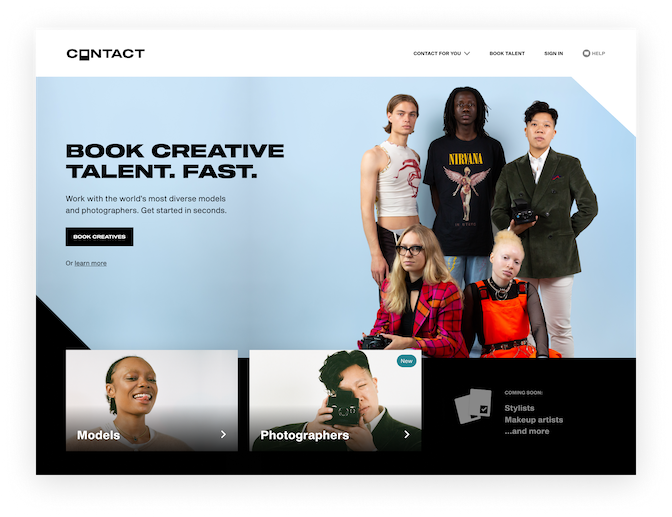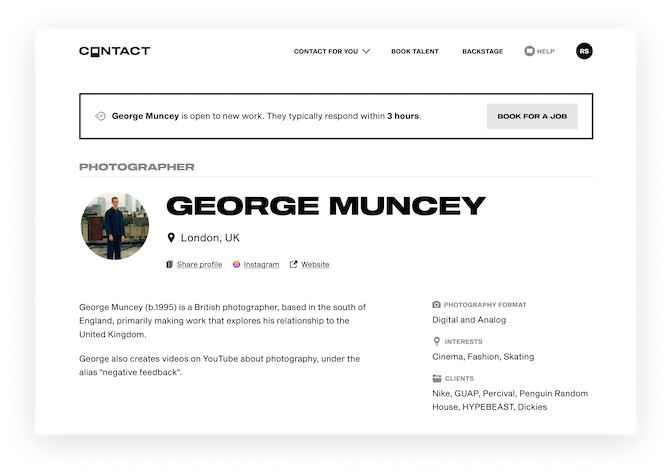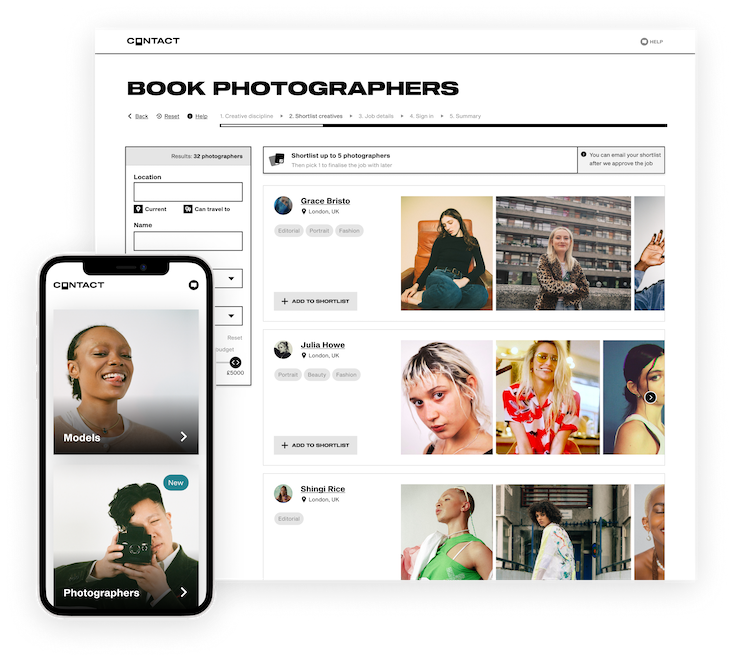With the pandemic digitizing every aspect of our lives, the Creator Economy has taken off like never before, with some estimates saying it’s now a $100 billion+ market. And yet, managing your professional life as a model, actor, writer or designer remains a mish-mash of emails, manual booking processes and dreaded PDFs. Creatives face late payments, and often opaque industry practices, even as top talent agencies have collectively achieved a valuation of $20 billion. But while modeling talent can be charged as much as a 20-40% commission fee, social media has been gradually displacing traditional agencies by reducing the barriers to entry and making talent more accessible. However, as everyone knows, social media is nowhere near a place anyone can manage their career.
Late last year the Contact platform launched, initially offering models a way to take bookings and manage some aspects of their work. It’s now looking to address the wider problems referred to above, with a new round of funding involving some key players in the creative industries.
It’s backed and supported by Maisie Williams, best known for her work on “Game of Thrones”, who has become Creative Strategist and Advisor to the startup after becoming a passionate advocate for better conditions for creatives in the industry.
Contact has now raised a $1.9 million (£1.4 million) seed round of funding led by Founders Fund. Also participating is LAUNCH (the fund led by investor Jason Calacanis), Sweet Capital (via Pippa Lamb), Rogue VC (via Alice Lloyd George) and Angel investors Simon Beckerman (co-founder of Depop), Eric Wahlforss (co-founder of SoundCloud and now Dance), Abe Burns and Joe White.
Although Contact’s initial incarnation is addressing the modeling world, its vision is far bigger. Contact co-founder and CEO Reuben Selby — a fashion designer who was formerly of William’s founding team, when she started her career — has worked with Nike, Thom Browne and JW Anderson. He says the platform aims to become a scalable back-end solution across the $104.2 billion Creator Economy, “democratizing” access to the world’s best creative talent.

Selby, who recently spoke about being a founder with autism, is also the founder and creative director of his own label, Reuben Selby, and co-founder of Cortex, a creative agency and community. Selby is joined by CTO Josh McMillan, previously of Deliveroo, Daisie, the Government Digital Service and others.
While its competitors might, broadly speaking, include Patreon, Creatively and The Dots, it’s fair to say that Contact’s vision to bring many aspects of these platforms under one roof could be described as ambitious; it is also tantalising.
In a radical move for what is an industry dominated by agencies, individuals and businesses can discover and book creators and creative services directly, without going through an agency.
Contact initially launched its platform in October 2020 with the ability to discover and book fashion models, but post-fundraising plans to roll out other creative verticals such as photographers, stylists, videographers, and more.

Selby says the idea for Contact has been informed by his own personal experiences trying to break into the creative industry as a model, photographer and creative director. After finding scant methods for secure and safe ways to get paid — while booking companies lacked basic technological tools — he realized that “middle-men” and agencies were the main players that benefitted, taking cuts on both sides and often still delivering a sub-par product.
So how does Contact work?
When a Creator joins, they are able to showcase their portfolio across different creative services and take direct bookings.
A business can then browse and discover talent using filters, shortlist creative talent, provide details about the job and book creators directly. Creatives can accept or reject jobs via the web platform or, soon, via a smartphone app. Once the job has been completed, the talent gets paid out via Contact.
Since soft-launching within the modeling vertical, Contact says it has onboarded almost 600 creatives and over 1,400 clients, including Depop, Farfetch, Nike, Vivienne Westwood and Vogue. Users of the platform have increased 100% YoY, says the startup.
Selby says Contact intends to remain in the background and allow the talent to brand itself independently across different verticals. Crucially, Contact does not take money from creators, only booking companies, from which it will levy a 20% fee on transactions.

Commenting, Trae Stephens, partner at Founders Fund, said: “We are always excited when we find founders who seem to have been born to build a specific company. Reuben definitely seems like one of those founders. We are really excited to watch the company scale and expand into new creative verticals.”
Pippa Lamb, partner at Sweet Capital, added: “The team at Contact have been pushing frontiers in the creator economy long before ‘the creator economy’ became a buzzword. Contact possesses a rare combination of world-class technical talent with the raw innovation of today’s most creative minds. We are excited about this next chapter.”
Williams, best known for playing Arya Stark on “Game of Thrones”, is no stranger to working on startups. She previously contributed to the Daisie platform, which continues to connect creators with one another to work on each others’ projects, helping creators find collaborators for their art.
But clearly her desire to disrupt the creative world largely controlled by “middle men” was not sated by the experience.
Speaking to me in an exclusive interview, Williams and Selby outlined their vision:
Selby said the existing marketplace for models is just the start: “The vision has always been about creatives, and getting creatives paid for their work. We basically started out in one vertical, the modeling industry… and we’re in the process of rolling out new verticals so bringing on photographers, makeup artists, stylists, etc. But that’s a very very small part of the overall vision.”
He said the focus now is “on the distribution of work, how that relationship works with that audience, how they can monetize it. So it’s basically giving them a toolkit to monetize their creativity rather than just the physical constraints. That’s what we’re exploring right now. We have this marketplace but we see that as being a very small part, but the larger piece.”
He said the marketplace model can connect brands directly to creators or creatives, but, he said, brands continue to have a great deal of power: “The creators are just sitting there waiting for somebody to give them something. So we’re now working out how they can just distribute their own work and monetize it in their own ways, with the back end of how all of the logistics work, and the operational side handled by the product that we’ve built, handling the payments and the licensing and insurance.”

Despite being a major Hollywood star, Williams told me the creative and entertainment industry she’s familiar with and works in remains stuck in an old world of emails and links, rather than the kinds of platforms the tech industry is used to building and using: “Being someone who has been represented by talent agencies for my career, that whole interaction online is emails. At no point are any of the assets digitised. There’s no ‘vault’ where all of my scripts go. There’s no place where I can upload all of my audition tapes. It’s always just a link in an email. There’s not really an industry standard. From an agency perspective, none of the work that they do is very streamlined or directional.”
She says that needs to change: “There’s a casting process and at the moment, it’s a hugely dated way of doing things between the casting directors and the actors, the writers etc. We want to build a very streamlined process.”
Speaking about the investors he’s assembled to back Contact, Selby said the team chose Founders Fund to be their lead investor because of their approach: “The way that they work with founders… I found that personally very empowering. [They] give you a lot of freedom and space to think creatively. So there was a clear alignment.”

Talking about the other angel investors in the round he said: “People like Eric and Simon are majorly connected in fashion and music culture in general.”
Speaking about how the entertainment industry might react to Contact, Williams said: “Actors have many other things that they do. Being able to have a platform that they can monetize all those other things is really important, especially because, as an actor you spend a lot of time unemployed.” But, she said, the system is constructed in such as a way that “you’re only as valuable as the auditions your agent puts you up for. It’s not very inspiring or rewarding. So a lot of actors make their own shows on streaming platforms or create their own documentaries or sell their work in other ways.”

She said Contact wants to be able to facilitate that through the platform, and for creatives to have more independence: “The film industry and the music industry is full of incredibly talented people who are multitalented across many different industries. But they are still, kind of held by representatives and agencies and record labels or managers who have a lot of power in, sort of, keeping them ‘small’. Being able to introduce something which can offer so many other tools, I think, is really important.”
It’s clear that the vision Selby, his co-founders and Williams have is very big. The question is, will they be able to pull it off?
It has to be said, however, that the combination of a passionate Gen Z-influential team (with added star power), a full-blown technology platform, heavyweight U.S. investors and angels pulled from creative industries certainly points to the potential for success.































Comment